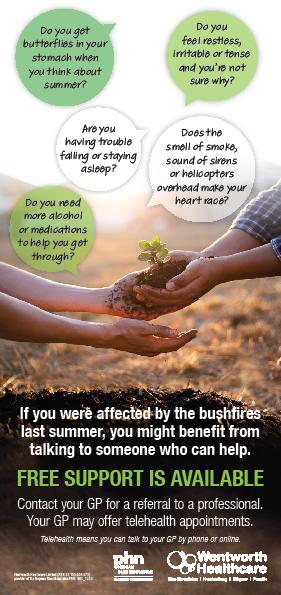Recovery Support Services
If you have been affected by bushfires, Recovery Support Services will help you in your recovery journey by providing personalised, long-term support.
Recovery Support Services will link you to your own personalised recovery support worker, who can help you navigate and access services and disaster assistance packages.
Recovery support workers will walk alongside you, providing you with help to address the complex challenges and issues that emerge throughout your recovery journey. Recovery Support Services will also build your connections with local community resources and can link you to programs and services.
Following previous disasters (2013 and 2019-20), the NSW Government funded the Step by Step Recovery Support Service which was available to affected Blue Mountains residents.
Step by Step focused on wellbeing, providing immediate emotional and social support. The program also helped with accessing grants, dealing with applications, insurance issues and by linking people to other recovery resources and services.
Read the Blue Mountains City Council Media Statements:
While Step by Step is no longer operating, we hope that such a successful roll-out would be repeated after any future major disasters.
Blue Mountains Services for Healh & Wellbeing Recovery
The Stronger Families Alliance has compiled a list of services available in the Blue Mountains for Health and Wellbeing Recovery. This includes contact details, location, opening hours and the services available at each venue.
Major events, such as the current NSW bush fires, that cause widespread loss and distress impact the whole community.
If you have been impacted by the recent fires, you might feel things like frustration, sadness and anxiety, or have trouble sleeping or remembering things.
This is a normal reaction to an abnormal event.
Having someone to listen and support you at times like this is important.
Some tips on managing your recovery include:
Keep checking in with your friends and neighbours and looking out for each other.
The resilience of people in regional communities is well known, but no one should feel like they need to go it alone in the coming days, weeks, or months.
Having someone to listen and support you at times like this is important.
The NSW Government has invested $15.3 million to support bushfire mental health. There are 30 clinicians across the State. People suffering from trauma or stress as a result of the State’s bushfire crisis should contact their local health service via the NSW Mental Health Line on 1800 011 511.
Information for people affected by trauma, their families and friends is available through a range of fact sheets and booklets which can be downloaded for FREE from Phoenix Australia.
Information for people affected by trauma, their families Watch clinical psychologist Dr Rob Gordon discuss strategies to cope with stress after an emergency, building trust and confidence in your community and learning to trust your own thinking and actions.
Building trust and confidence in your community post-emergency
Your well-being: Dealing with loss of homes and businesses
What should we expect of the next year?
Dealing with Anniversary & Reminders of Disaster Events
What to expect in the second year after the 2019/2020 summer bushfires
Bushfire recovery during COVID-19
Dr Gordon has spent the past 30 years working with people affected by emergencies and disasters. Rob was there in the aftermath of the Bali bombings and Christchurch earthquake, Black Saturday, the Canberra firestorm and, most recently, the Tasmanian bushfires, as well as many other large-scale disasters. He has advised the Red Cross and governments on how to assist individual people and whole communities as they rebuild and recover. His first-hand experience has helped many people affected by disasters to understand their reactions to trauma and grief, while his academic papers have contributed to new approaches to community engagement during the critical stages of recovery.
